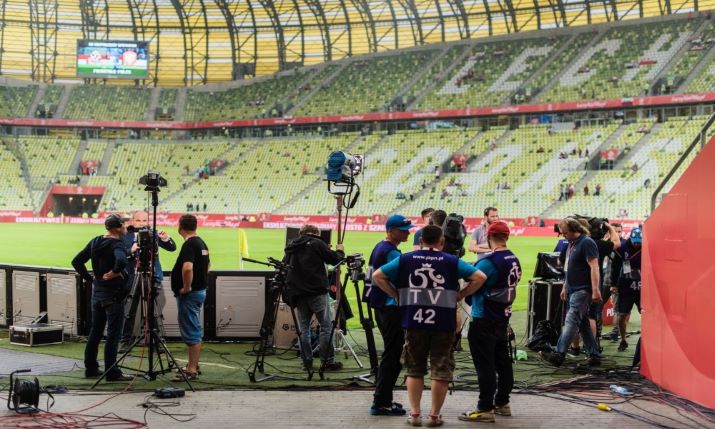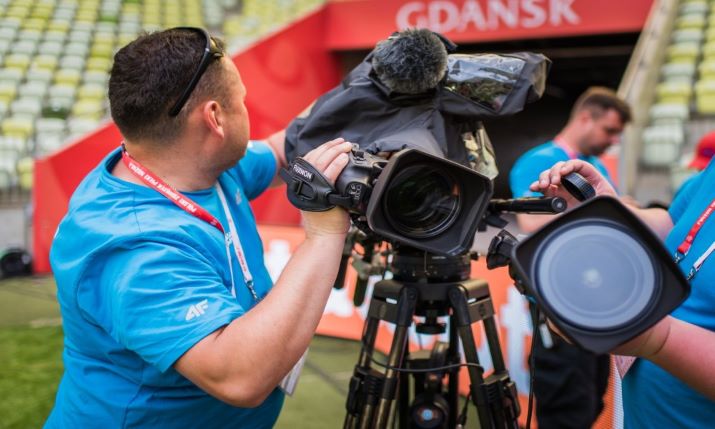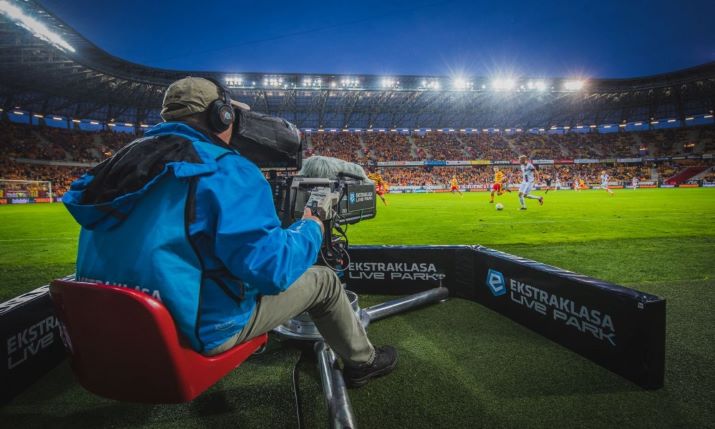Ekstraklasa kicks off Polish football season with Live Park covering all bases

Ekstraklasa Live Park is back on the road again with the new Polish football season
As Polish football federation Ekstraklasa kicked off the season on 23 July, production arm Ekstraklasa Live Park roared into action to bring all the drama on the pitch to football fans around the world.
Ekstraklasa games run from Friday to Monday each week throughout the season. There are nine games per match week, yet no games run simultaneously, which is useful for Live Park which has just three OBs at its disposal to cover every match across the country.
Live Park runs a tight operation each season. Marcin Serafin, chief operating officer at Ekstraklasa Live Park, notes that the pressure is on Live Park not to let down any of the clubs it works with.
He explains: “I think that the biggest challenge for us is just around the logistics; we need to be very careful scheduling the games, scheduling the match week, because we are using three OB vans for the whole nine games each match week. We need to be sure that we can go from stadium A to stadium B and be on time. As I see now, this is the biggest challenge for us currently.”
He goes on: “All clubs are shareholders of Ekstraklasa, so we have great cooperation and understanding of each other, and we’re also responsible for legal regulations for media and TV broadcasters, which helps us a lot [at Live Park] because we know exactly what our needs are and what we can [ask for] from each stadium and each club [for broadcast purposes]. So this is a really great.”

Live Park is producing at least 100 UHD HDR games per season for Ekstraklasa
Tight relationships
For the new season, Live Park is working with long term rights holder for the league, Canal+, as well as Polish TV network Telewizja Polska (TVP), which carries one match per week free to air, and it is also working with new Ekstraklasa rights holder, Nent Group.
Says Serafin: “Starting this season, we have a cooperation with Nent Group, which is the operator of the streaming platform called Viaplay. As of three weeks ago, we are doing a studio for Nent for Viaplay in Poland, with a gallery, studio, and the off-tube’s, at a rented studio at [OB and facilities provider] ATM for them, and we are doing all local sports production for Viaplay for them. Nent bought the Bundesliga rights for the long term and starting next season, they’re going to have the Premier League and from 2023, Formula 1.”
“We don’t want to spend a huge amount of money for broadcast innovations, because we are not one of the five or six leagues with huge budgets for their productions. We need to be careful when spending any single Euro”
The main rights holder for Ekstraklasa is Canal+, which broadcasts all games from the federation and has done so since 2011. Live Park produces the international live feed which Canal+ takes, as well as the half time and post-game shows for the broadcaster. This includes the Super Friday studio for every Friday match, which is set up on location, and Match of the Week which is on a Friday or Saturday, and sometimes Live Park produces a magazine show for Canal+, called League + Extra; this coming weekend’s big match on Sunday between Wisła Kraków versus Legia will see Canal+ using a large studio that Live Park has set up for the broadcaster in Krakow.
Serafin comments: “The relationship [with Canal+] is pretty good. It’s very easy because we know exactly what to do. Every weekend or every match, whichever game you’re doing, you’re doing more or less the same for them, which set up, all of it; it’s really great. We’re just giving them a signal and they do their own unilateral production.”
Solid set up and innovations
For the 2021/22 season, Live Park is continuing to provide its rights holders with matches filmed in UHD HDR. “We are producing at least 100 UHD HDR games per season,” notes Serafin. “We’ve already produced more than 250 games in UHD HDR, which is outstanding.”
Serafin comments on the sets ups used by Live Park throughout the clubs: “We’ve got three camera set ups. The basic one is 11 cameras, including one super slow mo. The second one is 13 or 14 cameras, including two super slow mo’s. And then the biggest one is for Canal+’s Super Friday, our [version of] Match of the Day, which is 20 cameras, one high motion, four super slow mo’s and one Polecam super slo behind the goal. Also, on two or three games per match week we use an RF steadycam.”
 On new workflow innovations Live Park is using for the 2021/22 season, Serafin says it is increasing its use of Lawo Kick, an automated mixing control for close ball mixing. Kick aids the audio production for major live sports events that use a ball for a fully automated, high quality, close ball audio mix.
On new workflow innovations Live Park is using for the 2021/22 season, Serafin says it is increasing its use of Lawo Kick, an automated mixing control for close ball mixing. Kick aids the audio production for major live sports events that use a ball for a fully automated, high quality, close ball audio mix.
Says Serafin: “We have added more Lawo Kick automatic mixing this season, based on tracking data. We started using it on one truck two or three years ago, and now for this season we’ve got it on our second truck. It helps a lot for our OB engineers, and it’s really nice for football games.”
“Because of the scale of the production for Ekstraklasa and because of the size of the country we are living in, the way we are producing, and because of the competition format, we can travel from stadium to stadium easily. So that means that we don’t need to spend a lot of huge amount of money for further fibre infrastructure”
Live Park has also signed a contract with Opta for live data from all games from this season. Serafin notes that more innovative developments are on the cards, but he has to keep in mind the tight budget that Ekstraklasa Live Park must work to. He explains: “Of course we’re working on new things, which are not confirmed, but I’ve got some things in my mind on how we can develop the product, [without spending too much money].
“We don’t want to spend a huge amount of money for broadcast innovations, because we are not one of the five or six leagues with huge budgets for their productions. We need to be careful when spending any single Euro. So we are looking for some new things, some of them are connected with tracking data, how we can use that data and also not only for live games, but also for the social media purposes of Ekstraklasa.”
On the road again
Live Park is working on location throughout the new football season due to various factors that make being on site a more financially sensible decision than remote production, at this point anyway. It has two of its own OB vans and hires a third from long-time partner, ATM. The trucks use Grass Valley cameras plus Canon lenses, including around 10 Canon UHD box lenses for big games.
Serafin explains: “Because of the scale of the production for Ekstraklasa and because of the size of the country we are living in, the way we are producing, and because of the competition format, we can travel from stadium to stadium easily. I think [driving from one to the next takes an] average two and a half to three hours. So that means that we don’t need to spend a lot of huge amount of money for further fibre infrastructure. But it is on my mind [to increase our remote production] so we are working on it; maybe a partial remote production with EVS operators at the Live Park premises for a few games and to have a remote connection to them, but it’s not efficient yet for us.”
Keeping crew safe
Around 98% of Live Park’s staff are now fully vaccinated, which is enabling the team to have some breathing space from worrying as much about the pandemic, and to think more about the job in hand.
However, Serafin adds: “Honestly, we’re waiting for the fourth wave, the scale of the fourth wave; it is the question of how big it is going to be. As we are vaccinated, I sleep much better than one year ago because I’m pretty sure that my staff is properly – I don’t know if I can say secure from COVID – prepared for the COVID. Now it’s a little bit stopped because we know many are vaccinated. [Last year] we spent a huge amount of money for [COVID] tests because, apart from the regular tests, if one in our community was affected, we had to test all the others that had contact with that person.”
He notes that while the team does not need to test regularly at this point, that position is likely to change as winter sets in. “I know starting maybe not September, but October or November, we may have to step back for a moment into the regulations we had a couple of months ago.”
